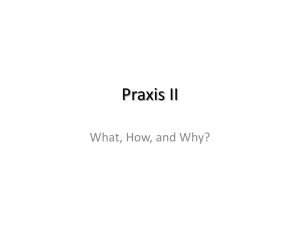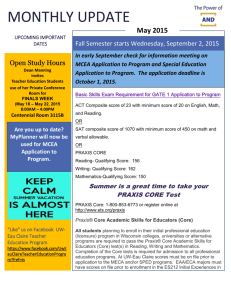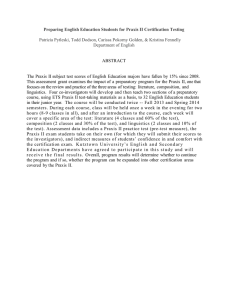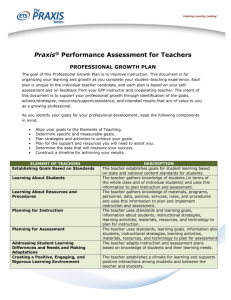Music Department Student Learning Outcomes Assessment, 2014-2015
advertisement
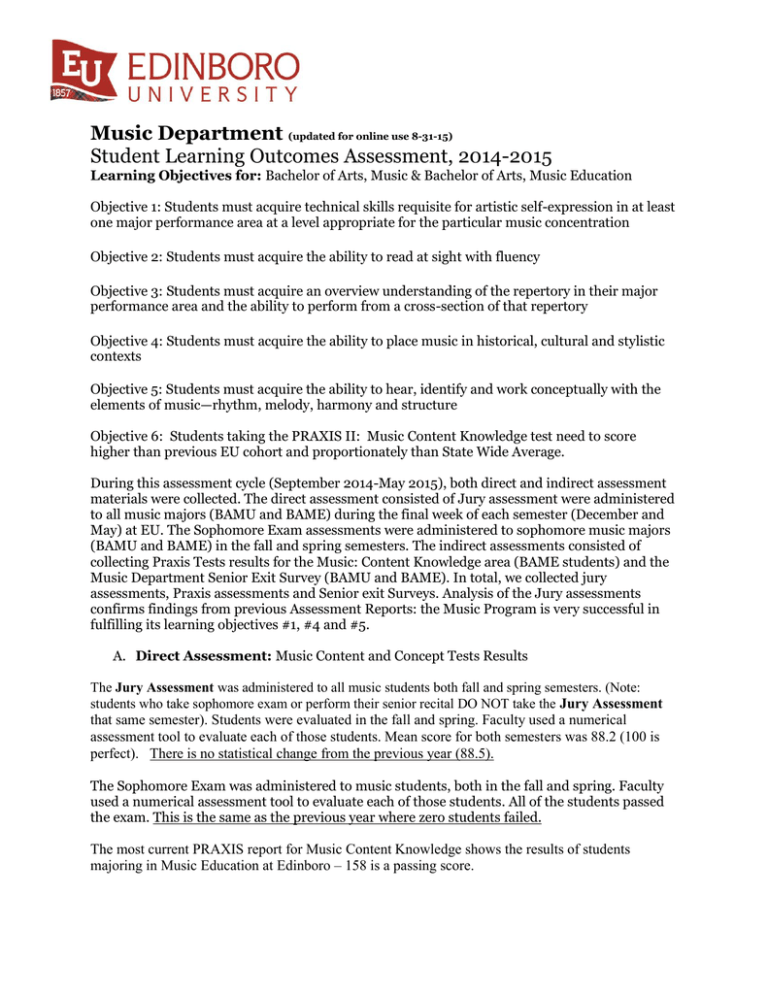
Music Department (updated for online use 8-31-15) Student Learning Outcomes Assessment, 2014-2015 Learning Objectives for: Bachelor of Arts, Music & Bachelor of Arts, Music Education Objective 1: Students must acquire technical skills requisite for artistic self-expression in at least one major performance area at a level appropriate for the particular music concentration Objective 2: Students must acquire the ability to read at sight with fluency Objective 3: Students must acquire an overview understanding of the repertory in their major performance area and the ability to perform from a cross-section of that repertory Objective 4: Students must acquire the ability to place music in historical, cultural and stylistic contexts Objective 5: Students must acquire the ability to hear, identify and work conceptually with the elements of music—rhythm, melody, harmony and structure Objective 6: Students taking the PRAXIS II: Music Content Knowledge test need to score higher than previous EU cohort and proportionately than State Wide Average. During this assessment cycle (September 2014-May 2015), both direct and indirect assessment materials were collected. The direct assessment consisted of Jury assessment were administered to all music majors (BAMU and BAME) during the final week of each semester (December and May) at EU. The Sophomore Exam assessments were administered to sophomore music majors (BAMU and BAME) in the fall and spring semesters. The indirect assessments consisted of collecting Praxis Tests results for the Music: Content Knowledge area (BAME students) and the Music Department Senior Exit Survey (BAMU and BAME). In total, we collected jury assessments, Praxis assessments and Senior exit Surveys. Analysis of the Jury assessments confirms findings from previous Assessment Reports: the Music Program is very successful in fulfilling its learning objectives #1, #4 and #5. A. Direct Assessment: Music Content and Concept Tests Results The Jury Assessment was administered to all music students both fall and spring semesters. (Note: students who take sophomore exam or perform their senior recital DO NOT take the Jury Assessment that same semester). Students were evaluated in the fall and spring. Faculty used a numerical assessment tool to evaluate each of those students. Mean score for both semesters was 88.2 (100 is perfect). There is no statistical change from the previous year (88.5). The Sophomore Exam was administered to music students, both in the fall and spring. Faculty used a numerical assessment tool to evaluate each of those students. All of the students passed the exam. This is the same as the previous year where zero students failed. The most current PRAXIS report for Music Content Knowledge shows the results of students majoring in Music Education at Edinboro – 158 is a passing score. PRAXIS: Music Content Knowledge 9/1/2012 – 8/31/2013 Test Score Median Score Average Performance All Examines (Pa) 168 160-176 Edinboro 167 165-171 Test Category State Wide Average % Correct 64 Edinboro Average % Correct 57 72 73 73 67 68 75 72 67 Music History and Literature Theory and Composition Performance Pedagogy, Professional Issues and Technology Special Category: Listening The results show that Edinboro Music Education students’ average 1% lower than the state – wide average. This is slightly better compared to last year. B. Indirect Assessment. Senior Exit Survey The most current Music Major Senior Exit Survey data reports graduating students have been satisfied with a majority of the music classes. Students did indicate the need for music technology courses as well as additional applied piano lessons. These comments are similar to the previous year. SUGGESTIONS / ACTIONS Our departmental goal is to maintain and increase the level of teaching and student learning in all our courses, especially those with new instructors and to do so, we must examine ways to measure student learning and suggest ways to make corrections / improvements. Our first step this year and perhaps the next academic year is to create baseline data for some of our new courses introduced into the curriculum. Once this new data is collected, we can compare results with previous data. In the short term, the department faculty have already agreed on the importance of maintaining and improving student learning outcomes – as measured by the PRAXIS tests. We have collected shared numerous resources (websites and PRAXIS music preparatory test books) to assist with preparing our students. We understand the data gathering process will take a couple years but we are committed to our discipline and our students and we will make necessary adjustments for the benefit of all.
